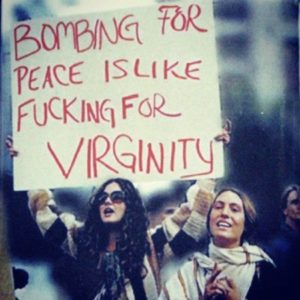Michele Santoro‘s broadcast Forbidden Peace was a moment of great civic value.
You may or may not agree with the ideas that have found acceptance there. This is not the point. The point is that such things widen the public sphere. And they make it more alive.
And this is good for everyone. Even for those with opposite ideas. Even for those who have already taken sides against the type of ideas, the family of ideas, which presumably will find a home in that space. Because what an event like that programme does is to protect the space in which they too, the opposites, the alleged enemies, better: the opponents, will be welcomed. Were they not there, yet, the day before yesterday? It’s not a problem. The debate of the intelligences is not the brawl, it is not the battle of ideas, it is not a show.
The debate by the demos is unfolded throughout various times and spaces. It was clear from the outset that the position of this broadcast would not be interventionist, it was clear that it would be pacifist. It is not within the space of this program and of this episode (if as it is hoped there will be other appointments) that the others must necessarily find space. The public space goes far beyond the space constituted by The Forbidden Peace. To enlarge. Not to assume and incorporate.
Since the day before yesterday, the public space – and I would add civil and democratic – is wider.
The need was felt.
In my house, with the friends I meet. With the people I converse with.
For example, we may ask: why is it forbidden?
I think the main and simple reason is that someone might realize that there is a way to stop the war, and that is to make peace. Some might say that waging war for peace is crazy nonsense. Same as walking to stay still. Sleeping to stay awake. Eating to fast. Or, as a memorable placard of a pacifist girl at a demonstration said years ago: bombing for peace is like fucking for virginity.

I wrote two months ago – to view the previous editorial by Paolo Naldini click here, ed – some reflections on the war in Ukraine and now that micro, that nano space of expression, resonates in harmony with the (much more) important words and expressions that they found a home in the Forbidden Peace. There, too, Gandhi was evoked as in my text. Of course it was a bit ungenerous for me to evoke it as a missed existential opportunity for Zelens’kyj. Just as perhaps it was excessive to speak of Napoleon with regard to Putin, certainly not in reference to their cynicism, but in relation to the qualities of statesman and probably also to those of general.
In any case, thanks to those who created this enlargement of the civic space. They did it for me too.

